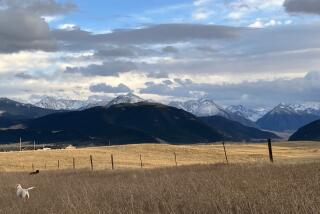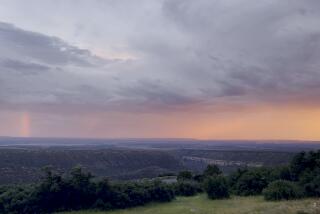THE IMPORTANCE OF LOAFING
To this lover of city living, usually unnerved by the absence of crowds and concrete, loafing around Jackson Hole in Wyoming has come as a delayed but nonetheless delicious discovery.
It is partly because it is an enforced relaxation. As a broadcast journalist, I have found that being buried in the news year-round is habit. But settling in on a ranch at the base of the magnificent Tetons makes keeping up with the news so difficult that it’s easier to put the habit aside--along with suits and neckties.
Unless, of course, one finds satisfaction in a steady diet of the Casper Tribune. I don’t count USA Today as enough for anyone’s minimum daily requirement, but that’s about the only other publication regularly available where we have stayed.
Jackson Hole is the name trappers are said to have given the place. It is a valley high up in the mountains and its largest town, also named Jackson, is the Teton county seat. There was no TV in the cabins at our favorite ranch, but it does come in clearly at the bar in nearby Moose Village. That was my most frequent viewing spot, and the best signal is from Idaho Falls.
The local news, aside from road and weather conditions, is not the most exciting. As for radio, the mountains that ring Jackson cut off most of it, except for the local ABC affiliate. That means the news is limited to hourly snippets or, with his blend of shucks and chauvinism, Paul Harvey.
So there isn’t much, and that takes us back to the important business of loafing. For that, the Moose Bar is one of the splendid leisure spots in the area. It has picture windows looking out across the Snake River and directly at the Grand, tallest of the Grand Tetons, always capped with snow.
Except for the bar with that view, and a liquor store with an astonishing selection of wines, Moose Village is not much. But it is right outside the entrance to Grand Teton National Park, just down the road a few miles from Yellowstone, which puts it at the heart of some of the most beautiful country anywhere on earth.
It is also the nearest settlement to an old dude ranch that was called White Grass. My wife and I, often with other members of the family, had vacationed there for years. She spent a lot of time riding. The ranch had many horses and wranglers, and those men, the cowboys, suited the animals to the skills of the riders.
There were short rides into the woods and into the Tetons, and longer, more rugged ones. For those determined to play hard, there were pack trips of one or two nights, or longer, out on the trail. But there were also older, slower, gentler horses for those of us who wanted only the easiest riding.
It seemed the thing to do, just to try to fit in. That same effort at accommodation led me to rent cowboy wear each summer from Western Costume in Hollywood. No closet clutter, a fresh outfit each time, right down to hats and vests. Although in recent years I have acquired boots and Levi’s of my own.
But whether the clothing is mine or theirs, the time is easy. That’s what counts, because my kind of vacationer can be content with a stroll in the woods, or a walk along a creek so clear and fresh it must be tasted to be believed. Or, sometimes, just reading on a shady front porch.
Whatever the explanation, I find loafing around the Tetons a thoroughly pleasurable experience. Aside from the Moose Bar, there are such other entertainments as the Cowboy Bar in Jackson, where some of the biggest country stars perform. Music also is on the program at the Stagecoach, a few miles from Jackson in the town of Wilson. That’s on the road that leads up to the old Teton Pass, between Wyoming and Idaho. It is a road so steep and demanding of a motor vehicle that you can only wonder again at the strength of the pioneers who opened that trail with wagons and oxen.
The bars, incidentally, are cited not only for the food and drink they offer but for the people. The ranches around Wilson and other parts of the Jackson Valley have many wranglers who are equally at home in the saddle or at the controls of a tractor. A visitor can listen to them or, if it’s done carefully, talk with them. And it’s hard to imagine a truer picture of Western America than one can get over a beer at the Stagecoach, or maybe the Silver Dollar Bar in the Wirt Hotel in Jackson.
That’s good to know, because even in summer the storm clouds can boom in quickly from the north and wrap the Tetons so tightly that the Grand itself disappears in the thunder and lightning and rain. Having a refuge in mind is wise. Even more, it is a lovely feeling, listening to the crackle of a fire over the hammer of a storm, sharing the warmth with men and women who give off the good, strong smell of alfalfa and horses. It’s easy to luxuriate in such interludes, especially there in that high country that has captivated so many, from Theodore Roosevelt to Laurence Rockefeller, Owen Wister to Ansel Adams.
Sadly, our favorite place, White Grass, is gone. Its owner of many years, Frank Galey, whose parents had the ranch before him, died last year, and the National Park Service has taken over the land. The ranch will be missed, and most of all Frank Galey, but we’ve looked at several places and will surely settle on one in time for summer.
It has become so much more than a vacation. I think of the whole marvelous area as Stephen Vincent Benet once described a favorite place of his: “By the little sweet tasting brooks of the blond country . . . among the black mountains, the glacial springs.”
It is glorious, and going back is essential.
More to Read
Sign up for The Wild
We’ll help you find the best places to hike, bike and run, as well as the perfect silent spots for meditation and yoga.
You may occasionally receive promotional content from the Los Angeles Times.






